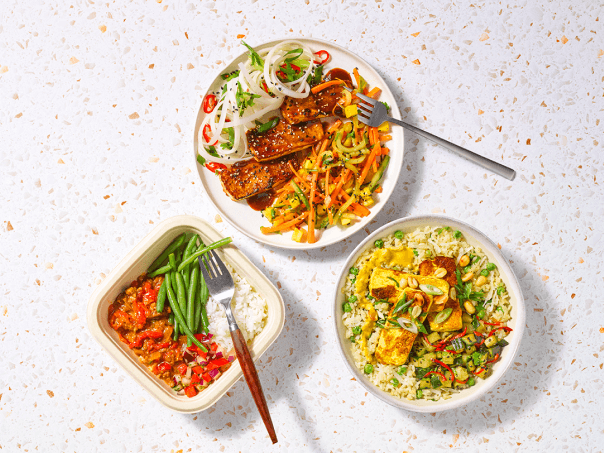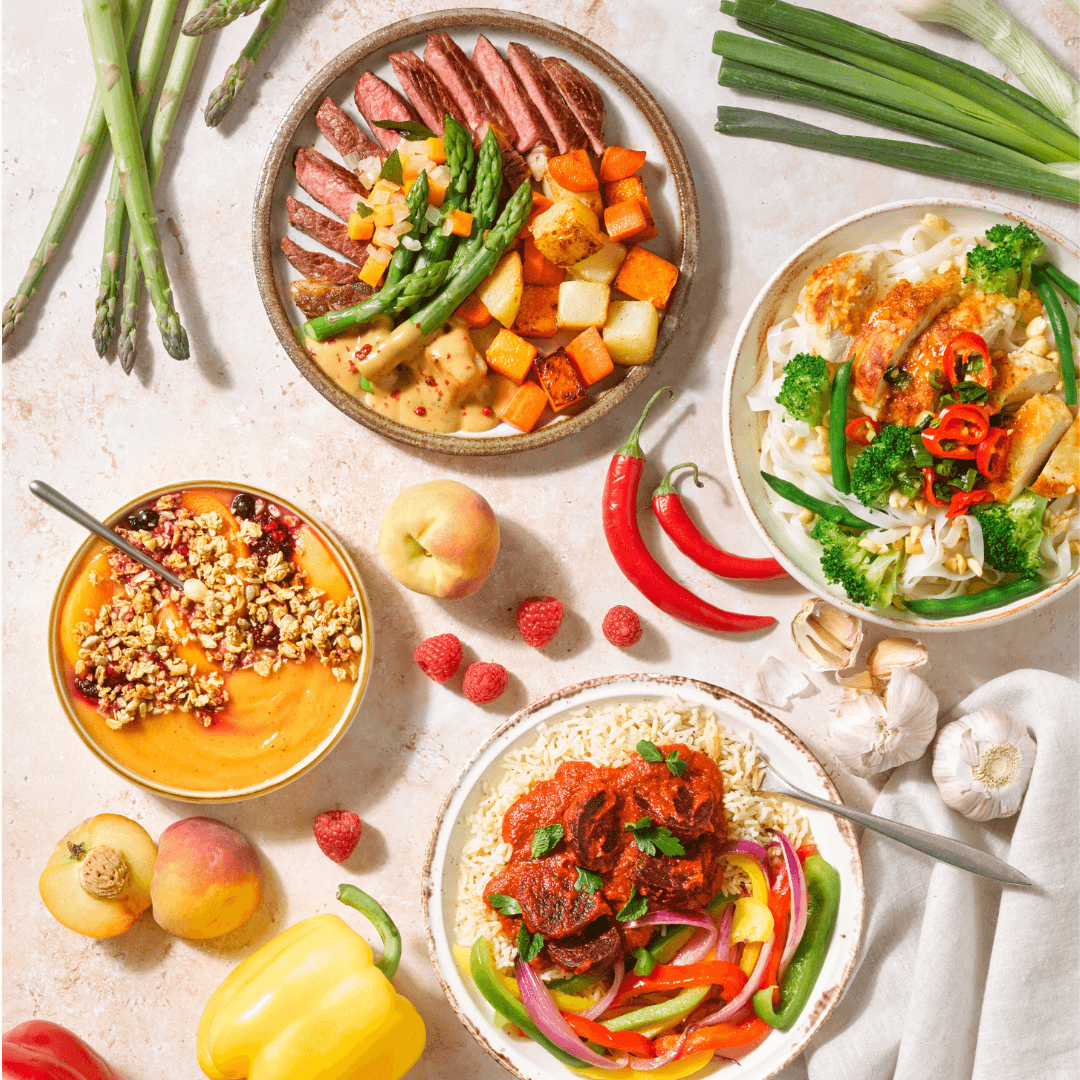Ready meals have become a staple in UK kitchens. More than three in ten consumers now eat them every week, and the UK remains Europe’s biggest market, buying an estimated 1.8 billion ready meals a year. They’re quick, affordable and easy to find, but growing awareness around ultra-processed foods (UPFs) is changing how people define convenience.
Recent research shows 77% of UK consumers are concerned about UPFs, and nearly 19 million have abandoned them altogether. Shoppers are beginning to question what’s really in their meals and how those choices affect their health over time.
On the surface, supermarket ready meals and Frive might look alike. Both promise fast, no-prep food that fits a busy schedule. In reality, what you’re getting for your money couldn’t be more different.
This comparison looks at what you really get when choosing between supermarket ready meals and Frive, from the freshness and quality of ingredients to the nutrition, value and convenience that shape your everyday health.
| Feature | Frive | Supermarket ready meals |
|---|---|---|
| Format | Fresh, ready-to-eat meals delivered chilled | Chilled or frozen for long shelf life |
| Cooking time | Ready in under 5 minutes | Typically 4–8 minutes in the microwave |
| Ingredients | Whole foods with no UPFs, additives or seed oils | Often contain ultra-processed ingredients in the form of thickeners, stabilisers, emulsifiers and processed oils |
| Nutrition | Macro-balanced, high in protein, rich in fibre and nutrients | Often lower in protein and fibre, higher in sodium and processed starches |
| Convenience | Delivered to your door with no shopping, prep or planning needed | Requires shop visits, label checks and fridge or freezer space |
| Variety | Over 40 rotating dishes every week across gluten-free, dairy-free, halal, vegan, high-protein, low-carb and low-calorie plans | Limited ranges that often lead to repeating the same meals |
| Sustainability | Recyclable packaging and curated portions reduce waste | Mixed plastics and mass production create higher waste |
| True cost | Higher upfront price but fewer extras, less waste and fewer takeaways | Cheaper at checkout but often needs add-ons and regular shop visits |
| Health focus | Built around freshness, balance and long-term wellbeing | Often prioritises price and shelf life over nutritional quality |
Are supermarket ready-meals healthy?
Supermarket ready meals are designed to be quick, cheap and widely available, but that does not always mean they are the healthiest choice.
To keep prices low and ensure long shelf lives, many rely on additives, stabilisers, emulsifiers and processed oils that help maintain texture and flavour over time. Protein is often reduced, while salt, sugar and modified starches increase to make meals taste satisfying at a lower cost.
These compromises do not make supermarket meals “bad”, but they do explain why many people find them filling in the moment yet not supportive of steady energy or long-term health. It also helps explain why more than 77% of UK shoppers are now concerned about ultra-processed foods and are looking for fresher alternatives in their weekly routine.
A healthier shift in convenience
In recent years, a new wave of fresh meal prep delivery providers has emerged. These services offer the same convenience as supermarket ready meals without depending on ultra-processed shortcuts. They tend to focus on:
- - Whole ingredients rather than additives, emulsifiers or UPF-style stabilisers
- - Balanced macros instead of cheap fillers or processed oils
- - Freshly cooked dishes are delivered chilled rather than engineered for long storage
- - Shorter shelf lives that prioritise nutrition and real-food quality instead of shelf stability
This shift allows people to enjoy quick, no-prep meals while choosing options that feel closer to home cooking and further away from mass-produced trays.
One such provider is Frive, which prioritises whole foods, no UPFs, chef-made cooking and fresh, ready-to-eat meals delivered directly to your door.
In the section below, we compare Frive to supermarket ready meals to help you understand the pros and cons of each option and decide which is the best fit for your goals and lifestyle.
Frive vs supermarket ready-made meals
To help you choose the right type of ready meal for your routine, here we compare Frive and supermarket options side by side. We focus on three core factors that shape everyday eating: what is in your meal, how much time it saves and the real cost over time.
Quality and nutrition: What’s in your meal?
Frive
Frive meals are cooked fresh and delivered chilled, with every dish created by chefs and approved by nutritionists. The focus is on real-food cooking rather than processing, with:
- - Balanced and portion-controlled macros
- - Whole ingredients only
- - Zero UPFs, additives or seed oils
- - Fresh preparation that maintains natural flavour and texture
This delivers convenience without sacrificing nourishment or long-term wellbeing.
Supermarket meals
Supermarket ready meals are built for long shelf life and mass production. To stay affordable and stable in transit, many contain:
- - Stabilisers such as xanthan gum or guar gum
- - Thickening agents like modified starches or carrageenan
- - Preservatives, including potassium sorbate
- - Cheaper refined oils
- - Higher levels of salt, sugar and processed starches
These ingredients keep meals shelf-stable but often reduce nutritional quality by lowering protein and fibre while increasing sodium and additives. This is one reason why 6 out of 10 adults in the UK say they have reduced their intake of processed foods in the past year, choosing fresher options where possible.
Summary
Frive offers a premium, whole-food approach centred on nutrition and freshness. Supermarket ready meals remain a more affordable option for many households, but the trade-off often comes in the form of additives, UPFs and reduced nutritional value.
Convenience and effort: Which option saves you more time?
Frive
Frive was created for busy professionals and couples who want great-tasting, nutritious food without the time or headspace for cooking, planning or shopping. Meals are ordered online and delivered fresh up to four times a week, so you can
split your order between days like Sunday and Wednesday to keep everything fresher for longer.
Meals arrive fully prepared and heat in under five minutes, removing the daily pressure of deciding what to eat.
Frive also caters to a wide range of dietary needs with plans covering gluten-free, dairy-free, halal, vegan, high-protein and low-calorie options, making it easy to stay aligned with your goals without extra work.
With over 40 rotating dishes each week, Frive helps you stay consistent without the effort. It reduces:
- - Cooking time, because nothing needs preparing
- - Planning time, because menus are curated for you
- - Decision fatigue, because balanced meals are always ready
- - Last-minute takeaway habits, because a healthier option is in the fridge
It ensures your meals stay delicious and ready in minutes, removing the stress from busy days.
Supermarket meals
Supermarket ready meals heat up quickly, but they still involve several extra steps before you ever sit down to eat. A typical week might include:
- - Travelling to the shop, often multiple times
- - Comparing labels and scanning for healthier options
- - Queuing and paying, then packing and unpacking bags
- - Storing meals in the fridge or freezer once you get home
- - Falling back on the same familiar options, because supermarket ranges rarely change, and it is easier to grab what you know
For many households, this pattern repeats several times a week. A survey of 2,000 adults found that the average person visits a supermarket three times per week, spending just over 37 minutes each visit. Over a year, that adds up to more than four full days spent shopping.
Supermarket meals also lack built-in structure. Choices are often made in the moment depending on what is available that day, which makes it harder to maintain consistent, healthier routines.
Summary
Supermarket meals save minutes, but Frive saves hours. By removing the repeated shop visits, daily decisions and reliance on the same options, Frive turns eating well into a simple routine instead of another task on your list.
Cost vs value: What are you paying for in the long run?
Frive
A 6-meal Frive plan costs £47.94 (£7.99 per meal), with 40% off week one and 20% off weeks two and three for new customers. The price reflects fresh, whole ingredients, nutritionist-approved recipes and the time saved from not shopping, prepping or cooking.
Meals are complete, macro-balanced and portioned, so you do not need to buy extras or sides. Nationwide delivery is included, and because meals are ready in minutes, they help reduce spending on snacks, fillers and last-minute takeaways.
Key value comes from:
- - Higher ingredient quality with no UPFs or cheap fillers
- - Genuinely complete meals, removing the need to add extras
- - Fewer takeaways and impulse buys
- - Time saved by avoiding cooking and weekly shop visits
For a deeper look at hidden savings, see our guide ‘How much does meal prep delivery really save you’?
Supermarket meals
Supermarket ready meals usually cost £2.50 to £6 per portion, making them the clear winner on upfront price. For many households, this affordability is the main appeal. However, the lower cost often comes with trade-offs. Many supermarket meals are not complete on their own and need extra vegetables, protein or sides to feel balanced, which increases the real cost per serving.
There are also indirect costs, including:
- - Travel to the shop
- - Extra items added to the basket
- - Time spent shopping
- - Food waste from multi-buys or larger packs
Lower upfront cost does not always translate to lower weekly spend, especially when factoring in nutrition, quality and consistency.
Summary
Frive costs more upfront but delivers better ingredient quality, balanced meals and significant time savings. Supermarket meals remain the cheaper option, yet the true cost often rises once add-ons, shop visits and nutritional trade-offs are included.

Try Now: Frive’s Chicken Thigh Shawarma
The hidden footprint of ready meals
Ready meals create a significant environmental cost. The UK throws away around 90 billion pieces of plastic packaging each year, and 83% of it comes from food and drink.
Frive keeps its impact lower by using responsibly sourced British ingredients, recyclable packaging and weekly ordering that helps reduce food waste at home.
Supermarket ready meals, designed for long shelf life, often rely on mixed plastics that are harder to recycle and contribute more to overall waste.
Is healthy food too expensive? The real value behind better meals
The cost of living has rocketed in recent years and changed how people shop. Supermarket ready meals still tend to be the cheapest option at the checkout, which is why so many households rely on them.
But the real question is not only what costs less today, but what offers better value over time. Fresh meal prep delivery providers focus on whole ingredients, balanced nutrition and consistency, which can help reduce hidden everyday costs, such as:
- - Takeaways and impulse meals, which are often driven by a lack of time or planning
- - Extra snacks, purchased to “top up” meals that do not keep you full
- - Food waste, especially from groceries that go unused
- - Multiple trips to the shop, which add both time and travel costs
For many people, these savings create a more predictable weekly spend and better long-term eating habits.
Choosing fresh, balanced meals can support steadier energy, healthier routines and less decision-making pressure. For anyone who sees food as part of their wider wellbeing, the value often stretches far beyond the price of a single meal.
Who are ready-made meals best for?
How and why you eat often decides which ready meal works best. Supermarket options are built for speed and savings, while Frive is designed for people who want nutrition and freshness without the effort.
| Frive is better suited for: | Supermarket ready meals work well for: |
|---|---|
| Health-conscious individuals who want meals that support their wellbeing | Families feeding several people on a tight budget |
| Couples or young professionals balancing work, fitness and busy schedules | Busy parents who need affordable, quick options after work or school runs |
| People rebuilding healthier habits after burnout, dieting or illness | Students or young professionals looking for cheap, low-effort meals |
| Anyone avoiding UPFs and wanting clean, balanced nutrition without meal prep | Older adults who prefer simple, familiar food that is easy to store and reheat |
| Anyone short on time who still wants fresh, home-cooked quality meals without cooking | Anyone who values accessibility and being able to pick up meals while shopping locally |
If price is your top concern, supermarkets will always win on cost. But for those investing in nutrition, energy and their long-term health, Frive turns convenience into something genuinely good for you.
Final thoughts: Convenience has evolved
Supermarket ready meals offer speed and affordability, which is why they remain a practical choice for many households. But for people who want fresh, whole ingredients and reliable nutrition without cooking, Frive turns convenience into something more meaningful.
With meals that are ready in minutes and built around real food, it becomes easier to eat well every day without the planning, prep or compromises. When you look at long-term value, health and time saved, Frive shows how modern ready meals can genuinely support the way you live.
Try Frive today and see how effortless eating well can feel.
FAQs
Are supermarket ready meals actually healthy?
Supermarket ready meals are convenient and affordable, but they often rely on additives, stabilisers, processed oils and lower levels of protein and fibre to stay cheap and shelf-stable. They are fine in moderation, but they are not usually the best choice for long-term nutrition or steady energy.
What makes Frive different from supermarket ready meals?
Frive meals are cooked fresh, use whole ingredients and contain no UPFs, additives or seed oils. They arrive chilled and ready in under five minutes, so you get convenience without the usual compromises. Supermarket meals prioritise price and shelf life, which often means more processing and fewer nutrients.
Is Frive more expensive than supermarket meals?
Yes, Frive costs more upfront than most supermarket ready meals. However, Frive meals are complete and balanced, so you do not need to buy extras or sides. Many people also save money by reducing takeaways, snacks and wasted groceries, which can make the overall weekly cost more predictable.
Do fresh ready meals keep you full longer than supermarket ones?
Fresh meals that prioritise whole ingredients, higher protein and balanced macros tend to keep you full for longer. Many supermarket meals are lower in protein and fibre and higher in processed starches, which can leave you hungry sooner.
How much time can you save by using Frive instead of supermarket ready meals?
Supermarket meals heat quickly, but you still need to shop, compare labels and store food. Frive removes all of that. Meals are delivered to your door and ready in under five minutes, which saves hours across a typical week and reduces daily decision fatigue.
Are fresh meal prep services better for people avoiding UPFs?
Yes. Providers like Frive focus on whole ingredients and avoid ultra-processed fillers such as emulsifiers, stabilisers and seed oils. If you are trying to cut down on UPFs, fresh ready meals are usually a much better fit than supermarket options.
Who is Frive best suited for compared with supermarket ready meals?
Frive works best for people who want fresh, nutritious food without cooking, including busy professionals, couples, fitness-focused eaters and anyone avoiding UPFs. Supermarket ready meals suit households prioritising low cost, familiarity and the convenience of picking up meals during a shop.



